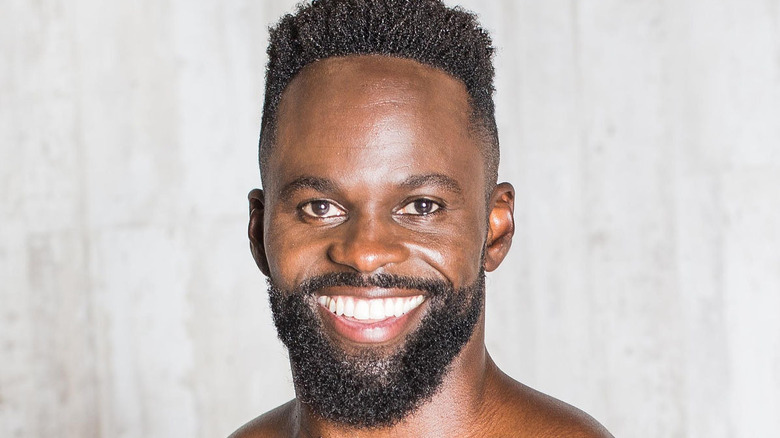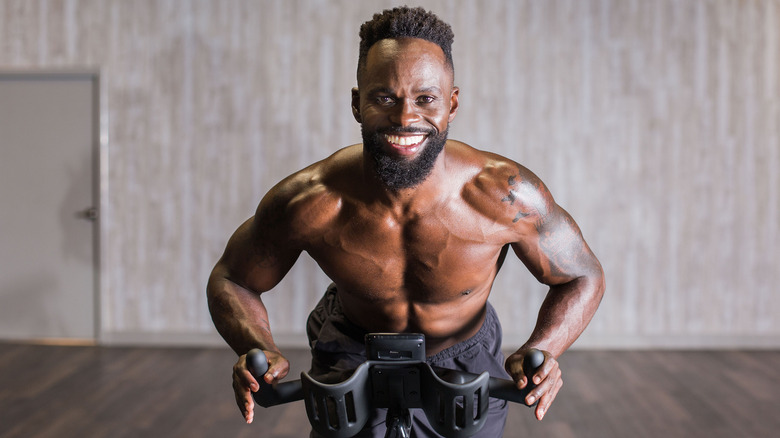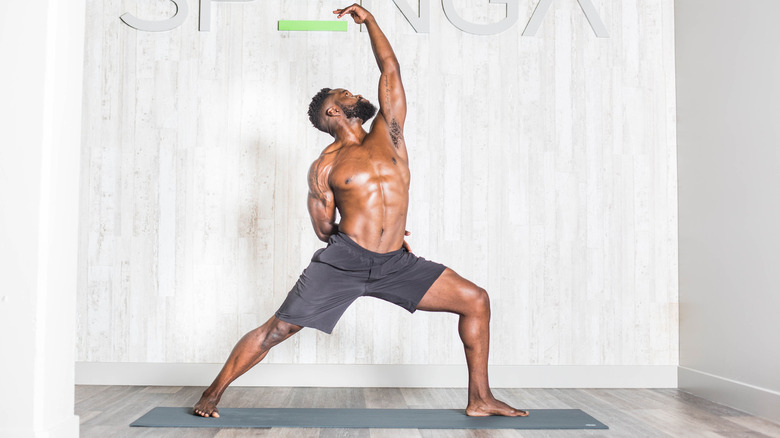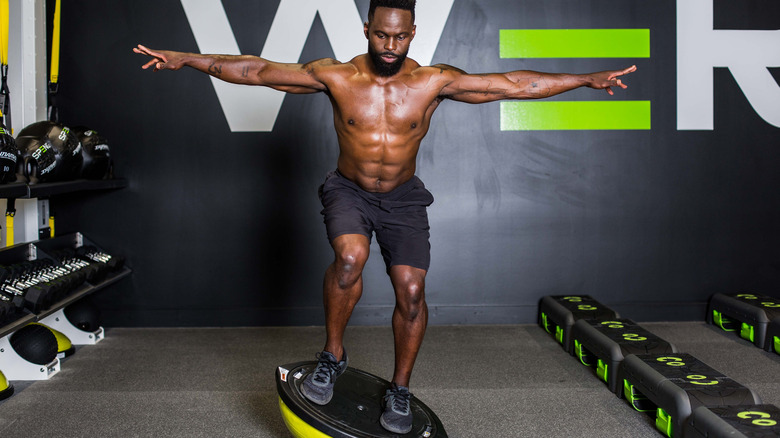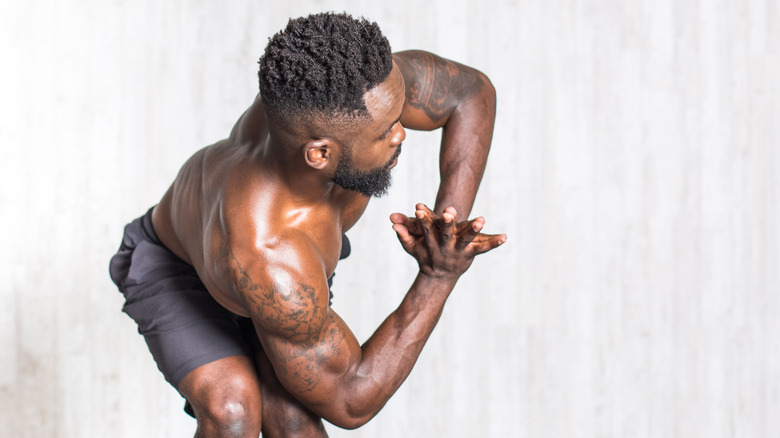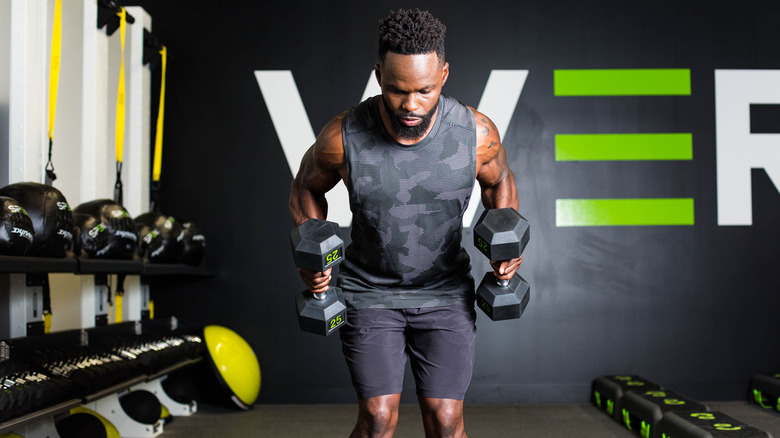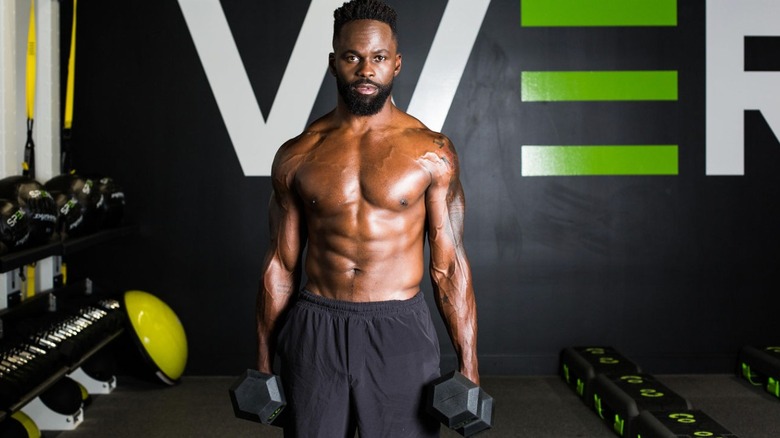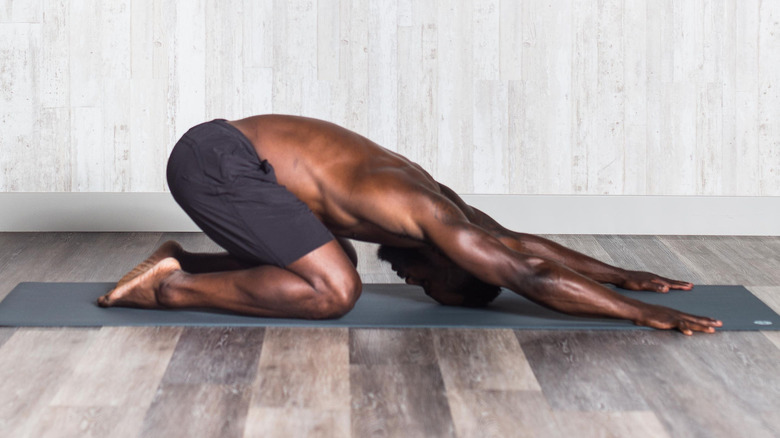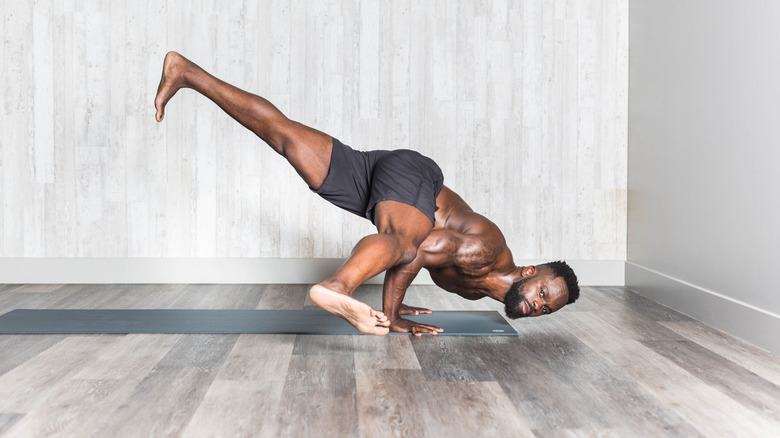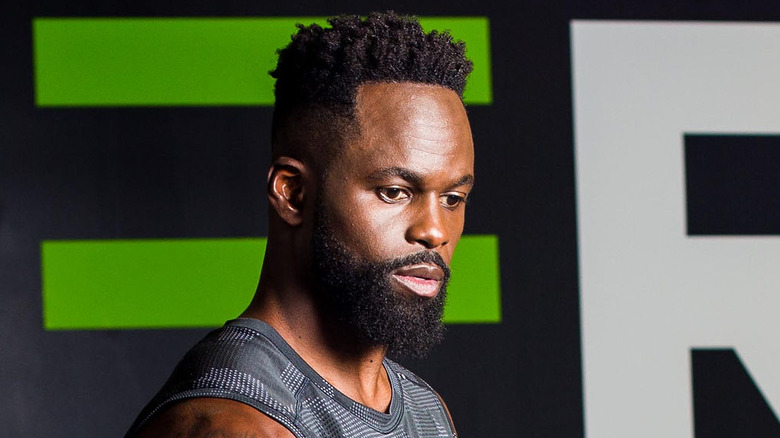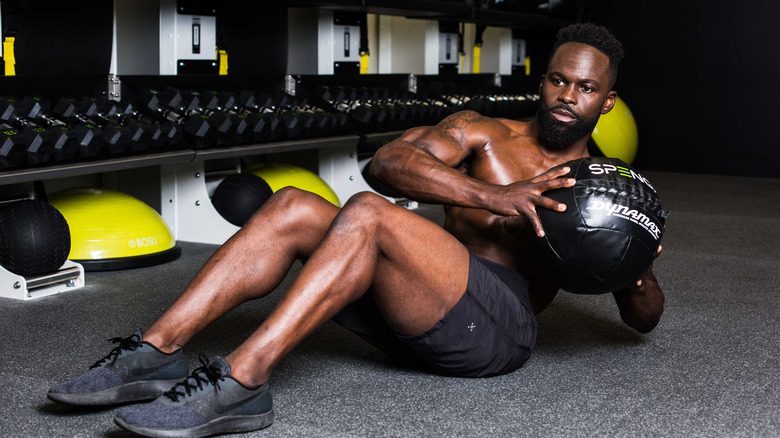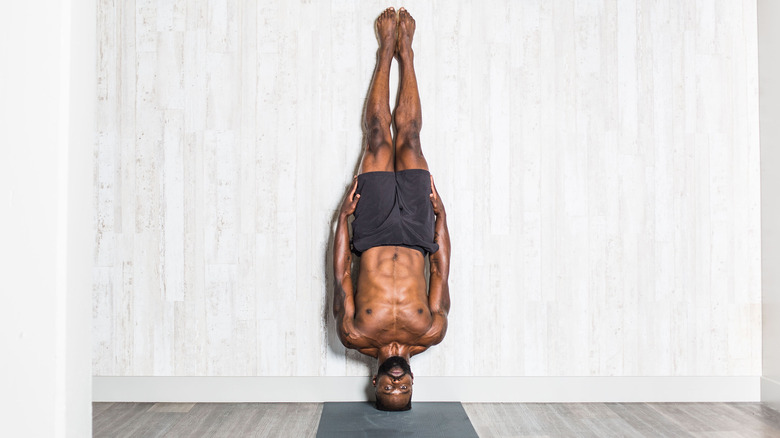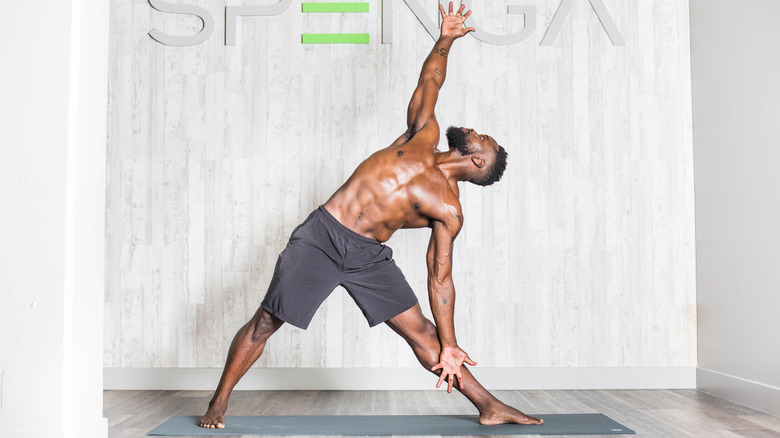Fitness And Finance Guru Eszylfie Taylor On Optimizing Your Mind, Body, And Money – Exclusive Interview
Superstar yoga teacher, finance guru, and all-around motivational powerhouse Eszylfie Taylor is on a mission to inspire. And that he does. We were lucky enough to sit down with Taylor and discovered how he stays on top of his many projects. Taylor thrives when defying odds (and gravity while doing yoga, it seems), but his humility and encouragement are such that he makes us believe that we can do whatever we set our minds to.
Though Taylor is involved in everything from providing financial guidance to his high net-worth clients to serving as an ambassador for Lululemon to being a #girldad, the core of what he does is simple: He believes that success is born of balance, which can be accomplished by nurturing the different pillars that support wellness. These pillars are the namesake trifecta of Taylor's app and upcoming docuseries, Mind. Body. Money. Once you cultivate an environment that aligns with your goals to fulfill your best and highest purpose, shoot for the stars. According to Taylor, this is where the keys to success lie, no matter what success looks like for you.
In this exclusive interview, Eszylfie Taylor opens up about his athletic history, his inspirational mindset, and so much more.
Saying yes can lead to incredible opportunities
I feel like you are the embodiment of hustle culture right now.
For everything that I am, I think it's the things that I have not been and the failures that I've had and the experience that have got me to this point. So if I can be a source of encouragement and guidance to you, anyone else, that's why I'm here. I'm happy to be that.
That's awesome. How does that tie into the work you're doing as a Lululemon ambassador?
I've got my hands in every part of this cookie jar — from my work in finance, to speaking, to ice cream company, to restaurateur, to brand ambassador model. I mean, I think that's what it comes down to for me in life right now is I just say yes. Do you want to do this? Yes. You want to go here? Yes. I'm open. I feel like, listen, at least my belief is, we have one life to live and I'm going to live it to the fullest and I'm going to swing away. And that doesn't mean that everything that I do is going to work out — doesn't mean that everything that I do is going to be fruitful. But I live with this idea. I want to die with memories, not dreams. And so I'm in the game and going full out.
Yoga is so much more than exercise
What initially got you into yoga?
I grew up as an athlete. I was a four-sport letterman in high school — played football, basketball, baseball, track, all the traditional sports. Went on, played collegiate basketball. And I had a hall-of-fame career and [I was] always really competitive, loved moving my body. And I realized, as I was getting older, I'm like, man, I don't know if I want to be chasing these young kids around on the basketball court forever. Something else. And so I picked up golf, actually. We start playing golf and were playing that a lot, but ... my back is hurting. My hips are hurting and a good friend of mine is like, "Try yoga. It's great." And I'm like, "Yoga? I'm never doing yoga. I mean, look at me. I'm not yoga."
So for literally years, she was like, "Try yoga." And I was resistant. Finally I was like, "Fine. I'll do your yoga." And I do a class and I'm like, "Wow." I had never felt like that. You don't stretch. When do you stretch for an hour? I didn't breathe. And I was hooked. And so I went from taking two, three days a week to taking every day, to taking twice a day to become a teacher. It's been an interesting ride. It changed me so much, not just physically but mentally and spiritually as well. So it's been a beautiful thing to find.
How long have you been teaching yoga?
I've been teaching yoga for about five years.
Where did you do your teacher training?
I did my teacher training at Core Power Yoga. So that's where I was ... as a student. And even then it's like, I don't have the time to do teacher training. I'm traveling, I'm speaking, I'm working all the time, but somehow I made it work and got in.
And I thought, truthfully, teaching would be easy. I'm like, "I take so much yoga. I mean, I've taken more yoga than most teachers, I feel like. So it teaching it should be a breeze." And it's one thing to know how to move your body in a certain way and another, for me to cue someone else's body. ... to be able to use words to adjust and I'm already such a big believer in the love of words and language and the power of them. And so it just further emphasizes the power of words. Because I can't go physically adjust 40 people in the class, I have to get them in the right spots. And so it's been something that has been a challenge and an area of growth that I've enjoyed.
An unquenchable desire to defy the odds makes for great business practices
Where did you play basketball in college?
Yeah, so I grew up here in Southern California, Pasadena. I was actually just recently inducted into the hall of fame for my high school for sports and that was great.
Congratulations.
Thank you. Thank you. I don't want to say I was a better football player, but football came more naturally to me I guess, but I loved basketball, I love the fact that no matter how tall you are or strong, fast, whatever, that if you didn't take the time to work on the skill of that game, you just wouldn't be good. And I'm 5'8". It's not like I'm 6'8" and it was easy. I'm not a big guy, but I love the game.
And again, if you can't tell already, I love defying the odds. Basketball player under 6'5"? Probably not ... And so I played college basketball at Concordia University in Portland, Oregon. I had a good time there, finished, we set school records for wins in the season, highest national ranking in the season, wins in a row in a season.
We had a good run and, unfortunately, I didn't make it to the NBA. I got a good education, graduated magna cum laude with a degree in business. I went and tackled the business world at 22 and that, but it's interesting, those traits and the tools and the things that I learned playing sports and basketball in particular, just translated into my work in business and prepared me for that.
Fitness is more than physical prowess
Fitness and finance are not two things that usually go together. How did you bridge the gap between the two?
Sure. I think my whole mantra in this mind, body, money movement that I'm trying to spread across of the world comes first with the power of positivity and manifestation. So your mind: Those who think they can do something and those that think cannot do something are both usually right. So it starts here. Then the body and health and wellness and moving our body and being strong and having energy, that directly impacts the money and you go, "Well, why? What does your body have to do with money?"
Well, in order to make money, think about this — if I'm opening my own business or I'm a high-level executive, I'm probably the first one there. I'm probably the last one to leave. I'm putting in hours. I'm traveling. You have to have strength. You have to be healthy. You have to have energy to do those things. And if I am a hundred pounds overweight and putting crap in my body and drinking and smoking and doing all these things, how could I then do what is required of me to put in the 14, 15, 16 hours?
That's the synergy, right? And even in, when I talk about body, naturally, we think, "Oh, body is our diet. It's what we eat." Diet isn't only what you eat. It's what you watch. It's what you listen to. It's who you surround yourself with. And so all of these things then translate into the money, but we need to master those things in that order: mind, body, and then the money will come.
If you took everything away from me right now, I'd be a millionaire again in 12 months because I believe that I will do that and I'm strong enough and healthy enough to put in the work required to make that happen.
Money is a tool
How does financial health fit into overall wellness? I'm hearing what you're saying as you're doing these steps to get here, but then does it continue to have a cumulative effect?
Here's the thing — in life you're getting better or you're getting worse. There's no staying the same. So even if you said, "Eszylfie, I did it." And that's truthfully what happened to me, I'm 22 years old coming out of college. I'm like, "By 25, I'm going to be a millionaire. Three years. Why not?" Well, I did it, it was a little late, but by 27 I did it. And what hit me like a ton of bricks is I realized, okay, I did it, I got the awards, I got the accolades. I have the net worth. Now what?
... If I have health with my finances, if I understand my insurance, if I understand my investments, if I understand taxes — see when I know things and that when you know things, you have knowledge, then that breeds confidence. When you know better than you can do better and alleviate [stress]. And even in markets we're in right now, there's a lot of volatility when there are dips in the market — this isn't time for me to be afraid, this is a buying opportunity for me, everything's on sale.
Who doesn't love a sale?
Right. I had a client call me frantic the other day, "Oh, the market's dropping. Should I sell?" And I'm like, "Relax. Relax." By the end of the day, the market had a recovery and she's like, "Oh, nevermind." And I'm like, "Yeah, had it your way, you would've sold your stuff and lost 10 grand." Stay the course. The road to walk a mile begins with a single step. So we put one foot in front of the other and we just go on this journey. But that's where it's not linear — like mind, body, then money, then you're good. No, it's just like this cycle that continues to run through.
A lot of people unfortunately will equate success to some monetary achievement. If you're a miserable, nasty person and I gave you $50 million right now, you'd simply be a miserable, nasty person with 50 million dollars. Money doesn't change who we are. Matter of fact, it puts a spotlight on who we are.
There is something called this happiness quotient, and the happiness quotient is basically the amount of money we need to have coming in to be happy. And when the study was done years ago, I think it was like $73,000. I think if you [factor in] inflation, now it's like 90-some-odd-thousand dollars. But ultimately when you're making that sum of money, it's been said that making more money doesn't make you any happier. If I gave you a million dollars, maybe you can buy a nicer home or nicer clothes or drive a fancier car, but that wouldn't make you happier. Because at that level you could afford food, clothing, shelter, and transportation.
So that's what I want people to understand. Money is a tool — it's not the end-all.
It's all about perspective
How does mental health fit into this whole picture?
Going back to that first pillar, the mind — oh, so powerful.
The other night I go to put on my light, my porch light, and all the bulbs are out. And it's this ordinate chandelier-type thing and I'm trying to slide my hands in there to unscrew it. And of course, I don't want to take the time to unscrew all the things. I'm like, I could just put my hand in there, whatever. And I have these two replacement light bulbs in my hand and as I'm unscrewing the one I'm like, "Man, I hope this doesn't drop. I hope this doesn't drop." And I switch it and I'm putting the other one in. I'm like, "I hope this doesn't drop. I think it's probably going to drop." And it just shattered. And as I was mad at myself, I'm like, I manifested that. I kept saying, "This is going to drop. This is going to drop." And then, of course, it dropped.
The mind ... is so powerful. So any time any negativity or anything creeps into mind, I'm like, "Oh, this will happen." I'm like, "Get out, get out of my head. Get out of my head." Because what we think will happen, will happen.
If you think about your own life, have you noticed when things are going well in your life, they go really well? Oh, I landed this deal. Well, that will come to me. And then that, and then boom, good things happen. And when things go bad, they go really bad. Well, that fell apart. What else is going to fall apart? And I'll probably lose that one too. And then all these things start to happen.
So I don't believe in winning and losing, I believe in winning and learning. All of these things, even negative things. I'm like, "What's the blessing from this? What can I learn from this? Ah, this person was revealed to me. Thank you. Thank you. I'm glad that went bad. Thank you. Yes." And that is the way I choose to live.
And think about it. Does a rose bush have thorns or does a thorn bush have roses? It's perspective. You see, perspective is not the truth. It's simply what you see. So now I have a choice. I have the choice to say, "Well, do I want to focus on this prickly ugly part of this plant, or do I want to focus on the beauty and the fragrance?" And it's ultimately a choice.
How financial advisors use the Taylor Method to find success
Switching gears just a little bit, tell me about the Taylor Method.
I've been a financial advisor for 22 years, and again, biggest failure you can ever meet. But in spite of that, I just continued to press on, fall down, stand up, fall down, stand up. And I've been blessed enough to be very decorated in my field. In 2015, I was named [one of] Advisor Today Magazine's top four financial advisors in the country under 40. And I learned a lot and this is more or less a testament to my resilience, more so than intelligence, to be honest. And so for me, I realized, dang, I didn't have a "me." I didn't have a mentor. I didn't have someone saying, "Come here, kid, do this. Don't do that."
The Taylor Method is basically the culmination of my career's triumphs and failures, and my way of giving back to my industry and in turn giving back to the world because I'm training financial advisors to be better. A lot of things that your average person doesn't know.
The average financial advisor enters this industry — 66% don't make it past six months, 88% don't make it past three years. So I say in my industry, there are really only two types of people: new people and successful people. Because either you figure it out and you get good or you're out. So the Taylor Method is just this, think of me, I'm like the Tony Robbins of financial advisors, where I give advice and language and processes to advisors to not only survive but thrive in this industry.
That's awesome. I feel like that's probably inspiring a lot of people in that field.
Yeah. And it's great. I mean in the future, who knows where it will go because sales is universal, the product is irrelevant. When you understand the value of creating relationships with people and focusing on solving their problems rather than selling products, you'll be successful selling anything. And that's really what I preach.
Delegation makes juggling projects possible
And you have a nonprofit as well, correct?
I have a nonprofit that I founded called Future Stars. Again, my love of basketball. I have a youth basketball camp that I put on every summer for kids. There are two fundraising components associated with that. I do a charity golf tournament every year to raise money for that, as well as a gala. And the proceeds of those events allow me to scholarship kids to come to my camp. So they're getting t-shirts and balls and trophies and pizza parties and that, and then there's also a component whereby I'm able to provide scholarships for kids to finish school [and] further their education as well. So that's something near and dear to my heart. This summer will be our 19th year [of] basketball camp. We've got our 16th annual upcoming golf tournament and then our third gala.
Our golf tournament's coming up in about two months, here at La Quinta Country Club. And then the camp is the last week of July. ... I do that here at Maranatha High School, where I went here in Pasadena and then the gala is to be determined, but it'll probably be the latter part of October.
I also understand that you have daughters and a new fiancée. How do you balance all of the work things that you're doing, the nonprofit, your family, relationship — how are you balancing all of it?
It's said that if you want to get something done, give it to somebody who's really busy, they'll figure it out. And I think, we all know the phrase, "it takes a village." I don't do what I do by myself. It takes a great team — from my assistants, to my partners, to my managers, to everybody that I work with, to other professionals that I work with, that's how I'm able to do so much. And the thing that I would encourage other viewers or listeners to do is really identify what your highest and best use is and focus on that. And anything that is outside of your highest and best use either pay someone else to do it, partner with someone to do it, or just don't do it at all. And that's how I'm able to do what I do.
I've been a financial advisor for 22 years; by my estimation, I've done like 30,000-plus client meetings. I can build a financial plan in 10 minutes once I understand what someone's trying to accomplish — boom. The part of it that's long is data entry and analysis and setting up. That takes hours and hours. But do I need to do that? Nope. Pay people to do that. My job is to shake hands, kiss babies, and meet people. Help them. And so I want to spend my time doing that so I can engage in the activity long enough to reach my financial planning numbers in two, three hours of engagement with clients every day. ... How do you balance that? That's how, by delegation.
Finding balance is beyond valuable
CONTINUED: J. Paul Getty was the first recorded billionaire in United States history. He came up with the wealth-building principle. Stated simply: I'd rather earn 1% effort from a hundred people than 100% of my own. I understand the value of leverage in that. And listen, to be honest, pre-COVID, I would say that I had a sickness. I would be like, I have a sickness. I cannot stop. I was reading one time that we spend like 22 years of our life sleeping. And I'm like, "No, that's too much time — 22 years sleeping? No."
But again, the key is balance and that's what is certainly coming out of COVID. One thing that I learned, it's okay to take a break. It's okay to take a beat. Just don't quit. If you quit, that'll become a habit. So just saying, okay, hey, pre-COVID, I never would've ridden bikes with my daughters at three o'clock on a Wednesday. Never. I would've felt guilty.
Look, I own all the companies I have, so I could do whatever I want, but I just would've been like, "No, three o'clock on a Wednesday? No. I could be in a client meeting or I could be working on [something], I cannot." Now it's like, yeah, you can because that report, that call, that email will be there at 5 and it'll be there at 7. And so I still have a high, high level of feeling of responsibility for everything that I do.
As you can tell, I don't do anything a little bit. I give a hundred percent to the things I'm doing, but knowing that balance is okay and that family is okay, and then, listen, that's why I'm doing it. Why are you killing yourself to make all this money and do all this stuff if you can't enjoy your family and your friends and experience things? And so, trying to sprinkle more of that in [is important].
And then I love what I'm doing. I get to meet people and help them and teach yoga and feed people ice cream and [have them] come to my social club and then do a podcast and then put out a reality show and an app. Yeah. What sucks about that? So I don't even look like, oh, woe is me or I hate what I'm doing. I love it. I wish there were more hours in the day, to be honest.
Eszylfie Taylor even knows a thing or two about ice cream
Okay. This is the second reference you've made to the ice cream. Tell me about the ice cream!
The ice cream brand is called Creamalicious. We are in Target and Walmart now, as well as just signed to deal with Kroger, so that should probably commence some time before the end of the year as well, but it's an inclusion ice cream. It's the first Black-owned, nationally distributed ice cream company. So think like Coldstone with actual desserts infused into the ice cream. So not cherry flavor or lemon flavor, imagine lemon pound cake in your ice cream or sweet potato pie in your ice cream.
The founder is a woman named Liz Rogers — an amazing individual brought this together. And so I joined forces with her last year to bring this to the market. And I'm super excited about what she's built and where we're headed and proud to be a part of that.
And one of the things that's good about the ice cream company is it's not predicated on me. So many of the other things that I'm doing require my attention, require my presence, require my likeness, require my charisma, and what I love about this — and a true business runs in spite of you, not because of you — is the fact that can be on shelves and there's a social media following and blowing up. It's gone viral — that has nothing to do with the prowess of Eszylfie Taylor. Perfect.
What's the best flavor? We've got to know. For personal use.
The highest-selling flavor is the banana pudding. And then the Porch Light Peach Cobbler is also very good as well.
Your beginning doesn't dictate your end
So what do you want everybody reading this to know about Mind. Body. Money. as far as the docuseries, as far as the app — what do you want everybody to know?
I want everyone to know two sides of it, really. First is the what.
What is this? And what could I be? What does life have for me? And I think a lot of it is a lack of visibility. And I grew up, [what] I would consider, privileged. I grew up in Southern California going to a private school my whole life. I never worried about if there was going to be a roof over my head, or if I was going to have food on the table. I didn't have everything I wanted, but I had everything that I needed.
And even growing up in that environment, I didn't know 99.9% of the things that I know now and that I learned about business and entrepreneurship and money and that. So I wanted to expose to the world, this is what is possible.
Don't limit yourself because [of where] you grew up. But "no, Eszylfie, I didn't grow up in a foreign household. No, Eszylfie, I grew up in the Midwest working on a farm." I don't care where you started. Your beginning doesn't dictate your end. So letting people know, okay, here's what's possible. And then almost more importantly on the heels of that, here's how you get it.
And that's what the show itself is designed to do. And the app is designed to do is tell people, "Hey guys, this exists. And if you want this, these are then the things that you need to do to make that happen." I even said, "I'm going to be a millionaire at 25." That is the what. At least I had that. I'm like, "I'm going to be a millionaire." But if you said, "Come here Eszylfie, let me talk to you. How exactly are you going to do that?" I'd have said, "I don't know."
Wellness encompasses the mind, the body, and money
My father was a doctor, employee. My mother worked for the government, employee. So my parents didn't come to me and say, "Come here. Here's how you start a business. And here's how you can buy some real estate." I just went in eyes closed. All right, am I doing this right? And that is again the crux of a lot of my failures because I just went away. I'm a gunslinger and which isn't always a good thing. There are some people who are very calculated. They measure twice and cut once. And I tend to just eyeball it, going, "Let's go." We'll figure it out. We'll figure it out on way.
understanding that about me and then also trying to build partnerships and develop relationships with people and staff that are not like me. And in particular, my partner on Taylor Method is like that. He's very pragmatic. Every calculated, new offering for Taylor Method, he's like, "Let's beta test this and see if it's worth it" And I'm like, "Oh no, I already told a thousand people it's coming out tomorrow. So release it." He's like, "Wait, what?" And so you need that. You need that yin and yang to balance out.
That's what I think that I'd want people to get. The show is a 30-minute series ... it's entertainment and you'll learn things. And then that next level is where can I get a deeper dive? And that's where the app comes in. So I've got Mind videos. There's an affirmation tool on there where you can listen to prerecorded affirmations. You can make your own, you can go to sleep to it. You can meditate to it. You've got Body — you've got body tutorials on diet, nutrition, health, everything like that, both mental and physical. And then you've got workouts. You can do yoga. You can do bicep and push-up series. You can do a core series. You can watch those videos on this app.
And then Money. "I don't know about estate taxes. What is that? Aren't trusts only for rich people?" No, here's how it works. "I want to buy a house. What do I need to think about?" Or, "Hey, I've got a family. People keep talking about life insurance. Do I need that? Or don't I just buy that when I'm 80?" It's just explaining to people this is how this works.
That is my whole thing. I don't need anyone to go, "Eszylfie, I will buy anything from you because you're great." You do or don't do whatever you want. Where I want people to understand this is how this works. And when you understand how it works, then you tell me how you'd like to proceed. But at least you know.
You can only control your own thoughts and actions
On behalf of everybody who's going to be super successful using this app and gain inspiration from the docuseries, thank you for your failures — because I feel like we're all about to learn a ton. My final question is what is your personal motivational mantra? If you have one, or if you have one that's working for you right now.
There are a few things that I say, and I start every class with this phrase: If you stay ready, you don't have to get ready.
For me, it's about staying ready. It's about being open. It's about when that all opportunity presents itself, I'm ready. And so that's what I pride myself in staying ready and learn and really remembering not to get too high on the highs and not get too low on the lows. If you came into my office, you couldn't tell whether a $50,000 deal fell into my lap, or one blew up.
Because the only thing I control — and this is the crux of my life right now — the only thing I control is the process. I only control what I do. So I learned to focus solely on the process and detach myself from the outcome. I don't control what happens. I don't control what you do. I don't control what the guy across the street does. I don't control what my children do. People are going to do or not do whatever they want, in their own timing, for their own reasons. So the only thing I control is me and my psyche and my efforts.
One of the lessons that I've been sharing a lot, and this is really coming into play right now with teenage daughters is, do not be upset about the results you didn't get, from the work you didn't do. Do not be upset about the results you didn't get from the work you didn't do.
So many of us are like, "Oh, I'm so upset. Or I'm mad because I didn't get this. Or I didn't get that." Did you do everything required of you? Did you do everything you could do? And if the answer's like, "Well, but they did." No, no, no, no. I'm not worried about that, did you do everything? And if you can say, "Yes, I did everything I could do. I was prepared and it still didn't go my way," then hey, it is what it is. Wasn't for you then, or maybe not for you right now.
To learn more about Mind. Body. Money. with Eszylfie Taylor, visit MindBodyMoney.com or download the iPhone app.

